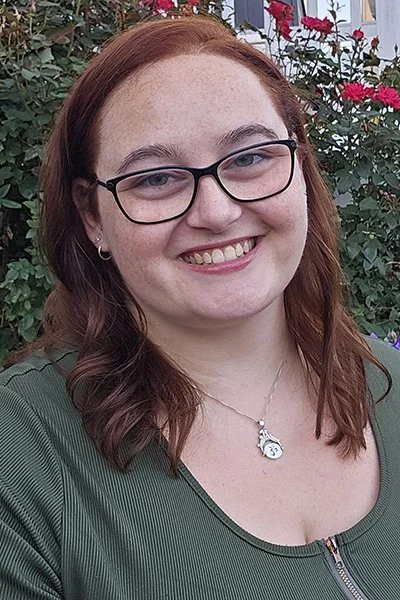JESSICA RISEMAN
This Spotlight appeared in our October 2025 newsletter.
To start, would you please introduce yourselves and tell us how you got connected to the Foundation?
My name is Jessica Riseman. I live with VWD Type 1 Severe.. Last year I attended a women’s retreat through the New England Hemophilia Association. It was there that I met a wonderful woman named Heather. She told me I would love VWD Connect and its community, and I think she was right!
Where do you live and what is something you would recommend to a friend visiting for the first time?
I live in Maine and highly recommend the Summers here. The ocean and lakes are to die for! I personally am not a fan of the snow, but if you are, Maine is the place for you!
How old were you when you were diagnosed with sVWD? What was that process like?
I was diagnosed with sVWD when I was around four or five years old. Because I was so young at the time, I didn’t fully understand what the diagnosis meant or how it would affect my life. I was also adopted, so this was something entirely new for my family, and only affected me. Looking back, I realize how lucky I was to be diagnosed so early. My parents did their best to keep me informed and involved in my care, and they worked hard to help me feel supported. Still, I don’t think I truly began to grasp the full impact of VWD until I hit puberty. That’s when things started to shift and I really began to understand what this diagnosis meant for me personally not just medically, but emotionally, and socially too.
As a fairly new Member, how has joining the Foundation changed your perspective on sVWD?
My relationship with my disease has historically been a difficult one. For most of my life, I saw sVWD as something that took from me, something that limited what I could do, made me feel inadequate, or even like a burden to others. It was isolating, and I didn’t really know anyone else who understood what that felt like.
Attending the conference and joining the Foundation changed that in a big way. Meeting people who not only live with sVWD but thrive! People who are kind, funny, smart, active, and compassionate was honestly healing for me. These are individuals who are so much more than their diagnosis and being around them helped shift how I see myself.
Instead of feeling alone with this condition, I now feel like I’m part of a supportive, empowering community. It is kind of amazing that something I once saw only as a source of pain is also what connects me to this awesome group of people.
What were your expectations coming to your first conference this year? How did the reality match up?
I wasn’t sure what to expect. I was nervous at first, knowing only one person. The nerves went away pretty quickly when I met everyone. It was so nice being in a space where everyone understands a part of my life that I feel so many don’t. I feel very thankful to have found this family!
In this issue, we looked at some of the surprising benefits enjoyed by horror fans by allowing themselves to endure scary situations, versus always avoiding that fearful feeling. The term ‘comfort zone’ is usually used metaphorically to describe circumstances in which we feel safe, but if you had to describe your ideal literal comfort zone, what would it look like?
If I had to visualize my Comfort Zone, it would be warm, sunny, and full of soft light, almost like the inside a watercolor painting. Everything would feel cozy, gentle, and welcoming. The kind of space that makes you want to curl up and stay forever.
But my comfort zone isn’t closed off. It has big windows that let me peek out at the world. And when I’m ready, there’s a door I can step through to try something new! The best part is, once I do step out, my comfort zone doesn’t disappear. It transforms into a support network that follows me, cheering me on, holding me up, and reminding me that I can always come back and rest if I need to.
What is something that you notice seems to be outside of most people comfort zone’s but comes naturally to you?
Starting conversations with new people. I think it’s the extrovert in me! An old roommate once joked, “We can’t go anywhere without Jess trying to make a new friend,” and honestly… he wasn’t wrong! I just really enjoy connecting with people, and I’ve learned that if someone is meant to be in your life, you really can’t say the wrong thing to the right person.
When you experience a situation in which you are called to step outside of your comfort zone, how do you inspire and/or motivate yourself?
When I’m about to step outside of my comfort zone, I like to imagine all the good things that could come from the new situation. I’ve always been really good at playing the “what if” game… but usually from the worst-case scenario side of things. What if no one likes me? What if I have a bleed? What if I get anxious?
Over time, I’ve learned to flip those “what ifs.” What if I make great friends? What if I learn something new? What if I actually love it?
I’ve found that the fear I have created in my own head is oftentimes scarier than whatever actually happens when I take the leap. And more often than not, I end up really glad I did.

